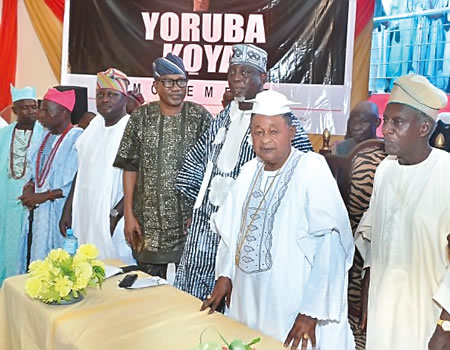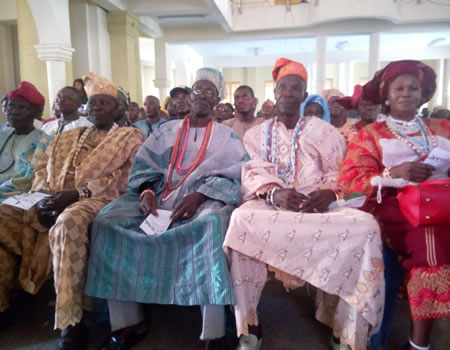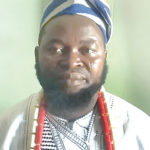
Oyo Township recently played host to a Yoruba reawakening gathering where the future of the ethnic group was discussed. TUNDE BUSARI who was there reports the many issues that informed the gathering.
As individuals and groups, guests invited to witness the One-Day conference were strolling into the premises of the historic Atiba Hall, less than 50 metres to the palace of the Alaafin of Oyo, Oba Olayiwola Adeyemi, in less than one hour, the sizable interior of the hall was filled to capacity by both invited guests and the enthusiastic organizers of the event, who had come to see a new direction to which the Yoruba nation would be led by a new pan Yoruba non-political group called Yoruba Ko’ya Movement.
On April 10, 2018, the movement came up with what it tagged ‘Yoruba April Declaration,’ a three-point resolution paper , which unambiguously affirmed the distinct position of the Yorubas in the socio-political development currently playing out in Nigeria.
Nigerian Tribune learnt that Yoruba Ko’ya is an adaptation of the former Agbekoya with a view to expanding its coverage to integrate all Yoruba towns and communities, not excluding those in the North Central of Kwara and Kogi States.
Against this background, the mood in the hall was right as the patient audience sat with high expectations. They desired to listen to what they wanted to hear from guest speakers led by Oba Adeyemi himself.
And coming barely 24 hours after former President Olusegun Obasanjo had surprisingly paid the leader of Afenifere, Pa Reuben Fasoranti a visit in Akure, the Ondo State capital, the attendees were expectant of good news on the way forward for Yorubas in the time suspected Fulani herdsmen are indiscriminately causing havoc on farmlands and farmers.
The arrival of Oba Adeyemi in company with the Oyo Mesi (The Alaafin-In-Council) amidst heavy drums and wild ovation formally signaled the opening of the programme. Robed in flowing white lace costume and matched with his traditional abetiaja cap, the traditional ruler walked leisurely into the hall and took his seat on the high table.
Already seated on the platform were other dignitaries including a retired Archbishop of the Methodist Church, Bishop Ayo Ladigbolu, retired Assistant Inspector General of Police, Tunji Alapini, the surviving founding member of the much dreaded Agbekoya, Chief Ayalu Olalere, the convener of the conference, Otunba Deji Osibogun among others.
No sooner had the Alaafin settled down than a team of compere led by the indefatigable former NTA, Ibadan man, Yemi Ogunyemi, set the ball rolling with a call for the national anthem, which was rendered live by the audience.
When called to deliver his welcome address, the convener, Osibogun could not until he acknowledged and indeed called upon Pa Olalere, who actively participated in the 1968 farmers’ revolt against the establishment, to treat the gathering to the background of the issues that eventually metamorphosed into the conference.

The 109-year old, who sat at the edge of the high table, picked the microphone and articulated his thought in a voice aptly depicting his age. He complained profusely of the escapades of the herdsmen, a development which, he revealed, provoked his contact with Osibogun and later gave birth to the new movement. He went down memory lane on the circumstances leading to farmers’ anger against the government in the late 60s, charging the audience to wake up in defense of their identity against what he called hovering danger on their roof.
“We should not leave a snake on our roof and go to sleep. We should not sleep with our eyes closed because there is danger at the backyard. We should, therefore, rise up now and the time is now,” he said.
However, the centenarian clarified that the movement was not out on a rebellious act but insisted on deserved respect for Yorubas in the federated composition of Nigeria.
Call for regional government resurfaces
Oba Adeyemi, who spoke extempore in breezy Yoruba Language, expressed his dismay at the Federal Government’s failure to disregard the resolutions of the 2014 National Conference organized by the former President Goodluck Jonathan.
The Alaafin said had the resolution been respected, the nation would have been saved from the growing suspicion and distrust among the federating units.
He lamented the imbalance that characterizes the Nigerian system in favour of a certain ethnic group and at the expense of others, blaming the Major Kaduna Nzeogwu-led coup of January 15, 1966 for the problem.
The traditional ruler said the Major General Aguiyi Ironsi regime, which took over power from Major Nzeogwu and other young majors, dealt a big blow to the existing regional governments with the promulgation of Decree 34 which introduced unitary system of government into the polity.
Before the military intervention, he stressed, Western Region had its constitution, its anthem, its symbol among other means of identity, adding that the region was setting pace for other ethnic groups in Nigeria and coming first in all fields of endeavor.
“But when they came with their guns, they deceived Nigerians by establishing federal character which schemed out merit; they created Joint Admissions and Matriculation Board (JAMB) which is now causing “Ijamba” to Nigerians.
“Today, a Yoruba man will score 240 while a Hausa man will score 120, yet they are both offered admission to study same course in the same university. They created education dis-advantaged states to their favour. Unless we revert to regional arrangement to allow each region to develop at its own pace, agitation will not end in the polity,” he noted.
While still speaking, he added that the killings in a section of the country should not be played down and seen as accident, saying it had become a serious issue of international embarrassment for the country. He reminded the audience that during President Muhammadu Buhari’s recent trip to the United States, President Donald Trump, told him to return home and sort out the killings in some parts of the country.
During his presentation, Bishop Ladigbolu shocked the hall with a reference to a 1969 ruling by the late Justice Adewale Thompson in Abeokuta. Thompson, according to Ladigbolu, ruled that it was criminal for cow to enter and destroy farm.
“Justice Thompson said it was impossible for a farmer to build a fence round his farm but mandatory for herdsmen to stay clear of farms. This judgment was delivered on April 17, 1969. Why was it not implemented? That was the beginning of the impunity we are witnessing everywhere today,” he said.
Rounding off his speech with a Yoruba song which was chorused by the audience, the outspoken cleric made a passionate appeal to the Alaafin to mobilise the elderly Yoruba to revive the traditional security measures against the incessant raid of farms.
“Baba Alaafin, you are in the best position to reach the elders to help us with their wisdom regarding what they used in those days to confront insecurity and other challenges. We are not talking of religion here. What we are talking about is our culture; we are talking about our heritage which our forefathers bequeathed to us. Yoruba Ko’ya is a child of necessity devoid of politics,” he said.
On behalf of the Aare Ona Kakanfo, Publicity Secretary of Oodua Peoples’ Congress (OPC), Barrister Yinka Oguntimehin asserted the status of Yoruba people as a viable ethnic group among others, urging the Yorubas to return to farm to have sufficient food and rely less on external supply.
“Netherland doesn’t have oil but the country makes 100bn dollars every year through agriculture. We are lagging behind in agriculture, nearly everything we consume in South West is either imported or brought from other regions. This must stop,” he said,

Osibogun assured the audience that the movement is a vehicle already on motion to a destination that would liberate the Yorubas from the claws of injustice.
He said the conference was a step forward and solution to food and security challenges confronting the Yorubas, following the raid on farmlands by herdsmen.
“It is hoped that it will go a long way to encourage more meaningful development efforts on issues relating to the effects of Fulani herdsmen-farmers crisis on food and security in South-west region,” he stated.
He called on all Yoruba sons and daughters home and in the diaspora to imbibe and adhere to the call for freedom and unity of Yorubaland in the spirit of the Yoruba Parapo Treaty.
The representative of Okun Development Association (ODA), an umbrella body of the Yorubas in Kogi State, Mr Tunde Ibrahim, called on the Alaafin and other traditional rulers to show interest in their condition, saying the presence of the association was to demonstrate their solidarity in Yoruba cause.
Accompanied by the head of Yoruba Hunters in Kogi State, Pastor Ogunbayoile Ojo, Ibrahim said of 21 local government councils that make up Kogi State, seven belong to the Yorubas, lamenting the margnalization being meted out to his people in the state.
The retired Director in Kogi State Bureau of Procurement, Lokoja, said the Yorubas do not intend to rock the boat. He, however, sought fairness in power distribution, referencing the incident of the last governorship elections.
“Where do they do such in the world where you leave deputy governor and picked another person to replace the governor who died before swearing in? This is the evidence of the treatment we are subjected to in that arrangement. That is why we ran back home to identify with our kith and kin. If our traditional rulers can go to Benin Republic, they should not abandon us in Kogi State. To arrive here, we drove for seven hours. But it is worth its while,” he remarked.
On a final note, Osibogun assured the audience of laws to protect the interest of the Yoruba within Nigerian federation, also clarifying that the movement was not an attempt to dismember Nigeria.
However, he said, “We demand for restructuring of Nigeria. Enough is enough of killings of our farmers, enough of destruction of our farms. Let us use to we have to get what we need. We should not allow bastards to rule us again.”
The Iyaloja of Oyo, Alhaja Peju Bakare promised the cooperation of market women to the movement and made a request for telephone numbers of the leaders for easy access and communication.
“Whatever our Baba Alaafin support is our own. That is why we are here to show our support for the movement,” she said.





